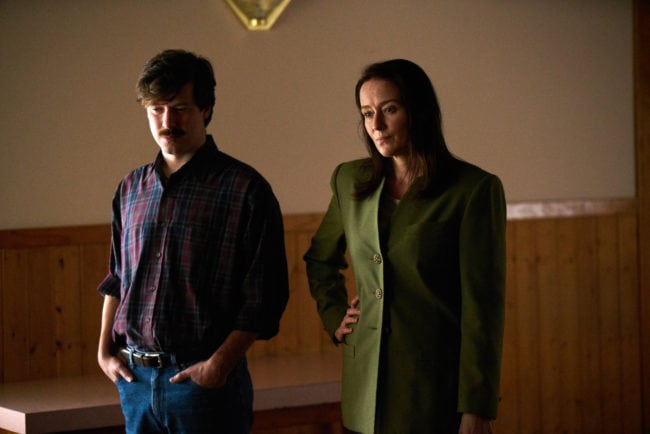The Miseducation of Cameron Post director Desiree Akhavan: People are scared to watch female sexuality

One of this decade’s most honest portrayals of what it’s like to be a teenager navigating sex, life and relationships has taught its director how uncomfortable people feel in confronting female desire.
Set in 1993, The Miseducation of Cameron Post, tells the story of a girl who is sent to a camp to be ‘cured’ of her homosexuality after she is caught having sex with her best friend.
Despite receiving strong reviews and winning the top prize at this year’s Sundance Festival, it still took two months to secure a US distributor—an unusually long time for Sundance hits.
Director Desiree Akhavan, who also produced the film and co-wrote it with Cecilia Frugiuele, has no doubt that the film has struggled to land in cinema screens because of its authentic portrayal of queer female sexuality.
“I think the ‘powers that be’ in the film industry are spineless,” she tells PinkNews.
“People don’t want to take the risk on a film that is queer, that is female-centric and queer, and deals frankly with female sexuality,” she adds.
But Akhavan, who is openly bisexual, does not shy away from challenging the status quo.

(Jeong Park/Vertigo Releasing)
Her first feature film, the 2014 Appropriate Behaviour, was an honest and hilarious depiction of a bisexual Persian-American woman, played by Akhavan herself, navigating career and relationship struggles.
By the time she made Appropriate Behaviour, Akhavan had already read and fell in love with The Miseducation of Cameron Post, a 2012 novel written by Emily M. Danforth.
“I didn’t love this book exclusively because it was queer, I loved it and it was queer,” she says.
“But it is what makes it special. If [the characters] weren’t queer, it wouldn’t be such an extraordinary [story of] courage … because of their courage, because of the circumstances they have to face. It’s tricky. I think it’s both the least and the most important element, weirdly enough,” she explains.
Despite her love for the book, Akhavan didn’t believe she could make it as her first or a second film. It took writing and producing partner Frugiuele to give her the confidence to pull it off.
The writing process took a year and required a deep-dive into the world of gay conversion therapy, starting with the research Danforth had carried out for the book and going further still.

(Courtesy of Vertigo Releasing)
They watched sermons for teens, researched self-proclaimed ex-gays, and enlisted the help of Mathew Surka, a conversion therapy survivor who launched the Born Perfect campaign to ban the practice across the US, to ensure authenticity in the film.
“There are definitely tragic figures in the world of gay conservation therapy in America,” Akhavan says. Researching that world was “absurd and depressing,” she adds, “but it didn’t make me question my own sexuality.”
Both elements of absurdity and tragedy emerge in The Miseducation of Cameron Post, particularly in the characters who run the God’s Promise facility, Dr. Lydia Marsh (played by Jennifer Ehle), and her brother Reverend Rick (John Gallagher Jr.), whom she claims she has ‘cured’ of homosexuality.
One of the strengths of Akhavan’s film is that there are no monsters in the world of gay conversion therapy, just people who try very hard to do what they think is best for others. The story is a powerful demonstration of the damage that misguided good intentions can sometimes cause.
Akhavan says she feels sympathy for a lot of the people involved in the gay conversion world, from the teenagers, to the preachers, and even the families who often force their children to attend the therapy.
“Even though what they do is terrible, no one wants to hurt their kids. I hope that’s not the case,” she says.
“It’s hard for people to wrap their brain around what a life would looks like outside of what they’ve been taught, around what success looks like outside of the mainstream of what they’ve been told.
“It takes a certain amount of courage and creativity and independence of thought to imagine a successful life for your homosexual child.

(Courtesy of Vertigo Releasing)
“Now it’s easier for us, we have examples, but they did not always exist. Even nowadays, for some people there is no success, and they’d be desperate to try anything to try help their kid not be gay.”
“I wanted to tell the story, tell it accurately, but also bring dignity to the people who were suffering,” Akhavan says.
At its heart, however, The Miseducation of Cameron Post is a coming-of-age story of what it takes to learn to be true and to trust yourself.
“I thought it was a really honest depiction of being a teenager and I realised I’ve never seen anything quite so realistic and honest about those years—the best and the worst of it,” Akhavan says.
Chloe Grace Moretz plays the title character, Cameron Post, a precocious young girl who thinks she knows who she is, but is forced to question and then rebuild herself to overcome the doubts the Marsh siblings instil in her.
Moretz’s Cameron isn’t alone, as she finds solace in the company of Jane (American Honey’s Sasha Lane) and Adam (Forrest Goodluck, seen in The Revenant) as well as the other teenagers who, for a variety of reasons, have had no choice but to put their faith in God’s Promise to rid them of their “same-sex attraction.”
The cast is incredibly and refreshingly diverse, which is something of a conscious decision on Akhavan’s part.
“I do care that the films I make reflect life as I see it, and growing up, I never saw anyone who looked like me on screen and I’m very sensitive to that,” she says. “It’s really exciting when you see something reflect your world.”

(Courtesy of Vertigo Releasing)
Audiences seem to agree. Despite opening in just two New York cinemas over the first weekend of August, the film still grossed $53,000, according to industry publication Deadline.
“I think that audiences would be open to it if these films were sold to them. It is distributors, financiers, Hollywood in general [who are] afraid to take a risk and afraid to do something new that breaks the mould of what they know they can monetise,” Akhavan says.
Akhavan explains that for a film to become not just a critical, but also a commercial success, distributors need to commit a substantial advertising budget.
“That kind of weight and esteem has been given to queer films about male coming of age in the past year, with Love, Simon and Call Me by Your Name. It will happen with Boy Erased, but for some reasons this film didn’t have that support.”
Akhavan has a few ideas of what those reasons may be. Americans, according to her, are “terrified” of women’s sexuality.
“Female empowerment can be traced back to sexual empowerment. There’s something about a woman owning her body and what she does with her body that is deeply scary,” she says.
Her fearless take is evident in the sex scenes portrayed in The Miseducation of Cameron Post, which place the viewers in Cameron’s perspective.

(Jeong Park/Veritgo Releasing)
This subjective view of female pleasure is rare and subversive—light years away from the depiction of lesbian sex in Blue Is the Warmest Color, which Akhavan describes as “creepy.”
But according to the director, her style makes viewers feel uncomfortable because it differs from what is perceived to be the norm.
“I don’t think people like to be in the female perspective of sex. I think they’re used to their women on their knees, with the back of their head in front of some guy’s crotch,” she explains.
Even female viewers, according to Akhavan, feel uneasy around female-centric depictions of sexual experiences, pleasure and desire.
“We’re used to a passivity when it comes to female sexuality and I wasn’t aware of that until I made this film. This film, and the selling of this film, the talking about this film has really shown to me how much it pushes people’s buttons. It’s been an education,” she says.
The Miseducation of Cameron Post is released across the UK on September 7.

